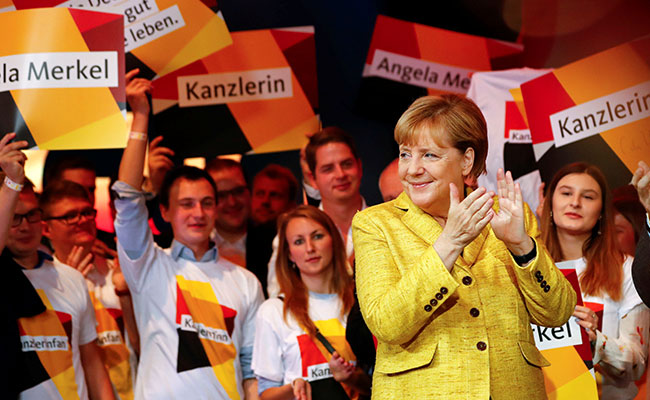 On Sunday, Germany elected Angela Merkel as chancellor for the fourth time, matching the postwar record set by the late Helmut Kohl, who was chancellor of West Germany at the time I was born there.
On Sunday, Germany elected Angela Merkel as chancellor for the fourth time, matching the postwar record set by the late Helmut Kohl, who was chancellor of West Germany at the time I was born there.
Helmut Kohl has cemented his place in German and European history as the unifier of East and West Germany and one of the original champions of the European Union. Merkel, a Kohl protégée, has now similarly made her mark as one of the Western world’s longest serving leaders, as well as a key figure in navigating Europe’s economic crisis, Brexit, and a migration crisis that drew 1.2 million people to Germany.
Overcoming the integration challenges associated with the migration crisis in particular will present Chancellor Merkel with the opportunity to maximize her impact on history. Broadly speaking, access to employment for refugees and immigrants is an important factor for successful integration. Merkel, therefore, should focus on developing policies and laws that focus on the socio-economic integration of refugees by addressing societal issues, like employment discrimination, head-on. If she seizes this moment, Merkel will ensure that these newly arrived refugees and their children not only build new economic opportunities for their own families, but also contribute to the fabric of a more diverse and aging German population.
Muslims, a visible minority in Germany, have experienced higher labor integration than Muslim communities in other European countries like neighboring France. To ensure continued economic integration of newly arrived refugees, the German government adopted the Integration Act in August 2016, which provides for integration classes, vocational training, employment, and training opportunities.
However, the law does not address hurdles that refugees may encounter once they are integrated. Educational achievement has not guaranteed a smooth transfer to gainful employment for immigrants in Germany. Studies indicate that ethnic minorities, including Turks, experience discrimination in the German labor market. Having a foreign name can also reduce the chance of getting a job interview; this happened to my father around the time that he completed his PhD in the late 1980s.
My father left the former Zaire, now the Democratic Republic of Congo, not long after the infamous “Rumble in the Jungle” boxing match in 1974. Not knowing any German, he left Zaire for Germany in hopes of becoming an engineer, having received a scholarship through the European Economic Community. My father was required to take one year of intensive German language courses at the Carl Duisberg Society. Thereafter, he gained acceptance to RWTH Aachen University to study electrical engineering.
By the time my father submitted his doctoral thesis in 1987, he expected that graduating with a PhD from one of Europe’s top engineering universities would result in numerous employment opportunities. That did not happen. He mailed out 50 resumes to various German companies and did not receive a single offer. I suspect that racial discrimination, unfortunately, was a contributing factor in this situation. One fateful day in January 1988, however, he decided to apply for a job interview in neighboring Luxembourg with an American company—General Motors. He got the job, and the rest, as they say, is history.
To be clear, the racial climate in German society has improved since the late 1980s, and Germany enacted the General Equal Treatment Act in 2006 to address employment discrimination based on categories like race and ethnic origin. The law, however, has noted gaps. The Federal Anti-Discrimination Agency, the body tasked with the implementation of the act, does not have the power to carry out their own investigations in discrimination proceedings, for example. If Germany expects refugees to fully integrate into German society, the hope is that they will be rewarded with employment opportunities that will permit them to enjoy all facets of German life. Everyday discrimination against ethnic minorities is still commonplace in Germany, and the Merkel government should develop legal and policy tools that adequately address the barrier that employment discrimination could present to the successful integration of refugees.
The German people are a resilient and welcoming people, and Chancellor Merkel took a huge political risk by opening Germany’s borders to the world’s most vulnerable because of it. In 2015, she famously said that Germany would overcome the challenges associated with the migration crisis by saying “wir schaffen das,” which translates to “we can do it.” I really hope she does—just like Helmut Kohl did when Germany faced uncertainty in earlier times. The stability of German society could hang in the balance.
Laura Kupe is a German-born, Congolese-American attorney and a Political Partner at Truman National Security Project. She served as a Special Assistant in the Office of Policy, working on European affairs, at the Department of Homeland Security in the Obama Administration. Views expressed are her own.